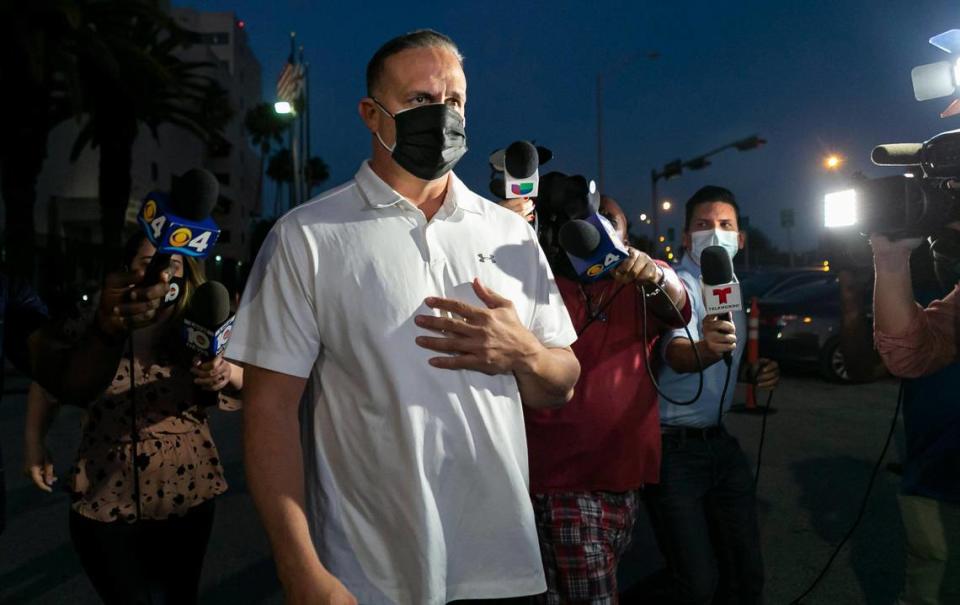Ethics panel rejects penalty for sham no-party candidate as not tough enough
A state ethics panel on Friday rejected a $6,500 fine against a sham no-party candidate who ran in a 2020 Miami-Dade legislative race, a rare move that was triggered by calls for stiffer penalties in a case one commissioner called one of the “most egregious” in Florida.
The Florida Commission on Ethics also found probable cause that Alexis Pedro Rodriguez filed inaccurate campaign documents with the state and accepted money from former Republican Sen. Frank Artiles with the understanding that he would change his party affiliation from Republican to no party to qualify to run in the Senate District 37 election.
Rodriguez — who is concurrently facing criminal charges in a Miami court, along with Artiles — now has the option to have a full evidentiary hearing on the ethics case or can try to renegotiate a settlement agreement with an ethics commission advocate.
Either way, the matter will need to come back to the commission. When it does, there will be a determination on whether any laws were broken, and if so, what penalties should be imposed.
Commissioners Jim Waldman and Travis Cummings, two of the nine commissioners, acknowledged on Friday that they considered Artiles a “friend,” a disclosure they said should not impact their ability to remain impartial in the ethics case.
‘A flat out bribe’
Waldman, a Fort Lauderdale attorney and a Democrat who served as a member of the Florida House with Artiles, said Rodriguez deserved to pay the maximum penalty for the alleged violations. That would amount to $20,000.
“I find this to be the most egregious thing that we’ve had since I’ve been on the commission. This actually was determinative, probably, of an election and this was a flat out bribe,” Waldman said. “We ought to have the maximum fine. ... I just can’t support this.”
Commission Chair Joanne Leznoff agreed that a different agreement needed to be reached.
“I don’t know whether this is the most egregious behavior, but it certainly ranks up there,” said Leznoff, a Republican from Fernandina Beach. “We deal with some very thorny issues, and the sacred trust regarding elections is paramount. So I, too, cannot feel comfortable with a vote that we support this stipulated agreement.”
The stipulated agreement the commission rejected had been reached in June. It said that Rodriguez would pay $1,500 for filing an inaccurate financial disclosure form and $5,000 for accepting money with the understanding that he would change his party affiliation to qualify to run as a candidate in the Senate race. Rodriguez’s attorney, William Barzee, and Elizabeth Miller, an ethics commission advocate, signed the agreement called a joint stipulation.
Miller said the $6,500 was reached, in part, because Rodriguez had criminal penalties and fines to pay in court stemming from criminal charges, which differ from the ethics violations.
Barzee declined to comment when reached by phone on Friday.
Origin of the ethics complaint
The ethics complaint was brought against Rodriguez in November 2020 by Juan Carlos Planas, a former Republican lawmaker and current Democrat elections attorney who represented former Sen. José Javier Rodríguez, the Democratic incumbent in the Senate District 37 race.
José Javier Rodríguez lost the race to Republican Ileana Garcia, a television personality and co-founder of Latinas for Trump, by 32 votes. Rodriguez, the no-party candidate who shared the surname with the Democratic incumbent, received more than 6,000 votes.
Planas said he was “shocked” to see the Florida Ethics Commission reject the $6,500 fine in the joint stipulation. He had no objections to the fine amount, in part because Rodriguez was cooperating, he said.
“It’s a double-edged sword. I’m glad that this will send a message for anyone not to do this in the future. But I hope this does not affect the cooperation that is being provided,” Planas said Friday.
Planas said he hopes the decision by the ethics commission does not create a “disincentive” for Rodriguez to stop cooperating with authorities.
Rodriguez, an auto-parts dealer who has been struggling financially, has been cooperating with authorities.
The ethics case differs from the criminal case, in which both Rodriguez and Artiles are tangled up in Miami court. But they stem from the allegation that Rodriguez accepted about $44,000 from Artiles in return for running in the Senate race.
Both men have pleaded not guilty to a series of felony charges and a jury trial is scheduled to begin Aug. 30.
Artiles and Rodriguez were both charged with four third-degree felonies related to the scheme, including conspiracy to make or accept campaign contributions in excess of legal limits, accepting and making those excess campaign contributions, false swearing in connection to an election and submitting false voter information.
Under state law, those charges carry sentences of up to five years in prison if convicted.
Rodriguez has been cooperating with Miami prosecutors in the criminal case.

 Yahoo Movies
Yahoo Movies 

